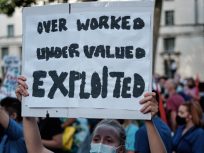Nikodemus Solitander is a postdoctoral researcher in Supply chain management and social responsibility at Hanken School of Economics, Finland. He can be contacted at nsolitander@gmail.com and followed on Twitter @CSR_FPtP
Not so long ago, the CEO of an international corporation (well-known for its Corporate Social Responsibility-programs and present in all of the ethical indexes and rankings) said during a well-attended meeting with the media that it will require a very difficult “trade-off” for management if the firm was “put” in situations where the shareholders’ interests were in conflict with “basic human rights”. This scenario was emphasized as constituting a “big problem”. This statement was preceded and followed by presentations regarding the firm’s CSR programs, codes-of-conduct, and participation in industry round-tables on human rights and how these would solve big problems such as this.
If human rights are a “trade-off”, a “risk”, then what are labor rights in the CSR discourse? The meanings are many and seemingly open for “debate”, it is a negotiation between the firm and the stakeholder – the singular employee. We do not need to look further than the UN and its agencies to see that labor rights are marginalized not only in the CSR discourse but in the overarching Sustainable Development agenda. It is an afterthought in the proposed United Nations development agenda beyond 2015, it gains its meaning through “individual empowerment” and “voluntary multi-stakeholder partnerships”. In all its irony, the infamous UN Women proposed (but then scrapped) partnership with Über, “accelerating economic opportunity for women” by promoting precarious work is the perfect, albeit sad, example of how ‘labor rights’ are increasingly understood in media, CSR academia, consumers and even the UN.
We can surmise many things from these two examples, but the narrative that interests me is that of CSR. I have been researching and teaching CSR for almost 15 years now. What I find most interesting, and perhaps disconsoling, is that within the CSR discourse there is seemingly no tension between running an established CSR program and postulating the “excruciating difficulty” of trading-off human rights and shareholder value. Especially since there are so many corporate narratives where human rights end up being sacrificed at this altar of supply chain complexity. Similarly there is no tension in the dominant version of the story in lifting up Über, of all companies, as a champion for decent work.
Many of my students believe, or desperately want to believe, that CSR stands for something good, that it is the “human face” of capitalism, the other side of the coin, a space where they as future managers or employees will be able to carve out a moral space. It is not. It is neither “good” nor “bad”, neither “good” nor “evil”, it is only a technical rational, a process for filling in and checking boxes in a “correct” or “incorrect” manner, following the impersonal logic of self-propelling principles. It will not in its current form, constitute a space for ethical decision-making for moral reflection of managers or employees. On the contrary, it is possible to go as far as saying that CSR has become project that eradicates moral ambiguity by suffocating the individual employee’s capacity for reflection about the moral substance of corporate action. This relief from responsibility is also visible in the outsourcing of ethical governance to various expert agencies and CSR indexes/rankings. Their job is simple, they do not engage in reflection about the moral substance of corporate action, they simply check for technical compliance. The message is clear to each employee: the reflexive capacity of employees (from CEO to the shop floor) is not sufficient to grasp the ethical tensions in the complex supply chains or make judgements about the “trade-off” between human rights and profit. The saddest example I have seen recently concerns Bennetton and their reasoning for their paltry contribution to the Rana Fund: “$1.1m is double the payment [Benetton] was advised to make by PwC, which Benetton commissioned to assess its fair contribution”. The message is clear, ethical decision-making is work to be done by “ethical experts” and “scientific methods” – and moral reasoning has no role to play. In the CSR discourse, workers are a number in a column, they are faceless and disposable.
CSR was again exposed through Rana Plaza, the emperor without clothes. All the brands involved run huge CSR programs and engage in voluntary, business-led private governance systems where labor is just another stakeholder at best. Almost no one with insight was surprised. Yet the human suffering seemingly “necessary” for this insight to break the media threshold was immense. It brought the face of ‘the Other’ closer to the consumer (and CEOs), at least for a while.
In a perverse way, with all its emphasis on transparency, what CSR is doing is creating a moral distance between the sites of consumption and the sites of production – because with its scientific language, technical rational and outsourcing of responsibility it is a threat to our capacity for moral reasoning. This is why I am not resting my hopes on legally binding CSR. But all is not lost, to paraphrase someone else; there is a crack in everything, that’s how the light gets in. Just as moral distance is socially constructed, it can, to a certain extent be deconstructed. The sites of consumption, the sites of decision, and the sites of administration must be linked to the sites of their social and environmental impact; the moral distance must be diminished. Solidarity cannot occur without being confronted with the face of ‘the Other’, solidarity includes a sense of responsibility for the Other even when there is no reciprocity, reward, or repayment to offer. In sofar, the ‘solidarity economy’ has been a ‘moral party of two’, between the amoral firm and the consumer. And here, the solidarity is mostly about solidarity with one’s own consumption habits, coming to terms with that – solidarity rarely transgresses the confines of slacktivism/clicktivism on Facebook… but let’s leave that debate for another time.
For me, the promise and the premise, of new and exciting governance arrangements such as the Bangladesh Accord on Fire and Safety lays not in its binding nature once corporations have voluntarily signed it but in the set-up and governance. For corporations it probably still falls into the constituent of CSR, but it alters the set-up of typical business driven governance systems where the firm is in the center and everyone is a stakeholder to it following the flawed logic of the dominant CSR paradigm. International Labor is as much in the driver’s seat as the firm. It offers a crack, a window of opportunity to break the ‘moral party of two’, to bring in the voice and face of the Other.
It is clear to me that even if we were suddenly given the space (by CSR or by some other means) for moral reasoning as employees, it is not enough. Morality requires a supplement, which is not CSR or business ethics, but politics. And here the labor movement, unions and the wider “world-of-work” community have an important role to play. Our work cut-out; this “community” is a patchwork of individuals, groups and/or organizations, characterized by some common interests but equally by internal conflicts and antagonisms. Local unions are often unable to break with their paternalistic legacy and, as is the case in the RMG sector, often struggle to give a voice to female workers; NGOs struggle with different kind of agency, representation and (Western) paternalism/maternalism issues; the international unions struggle with overrepresentation of Western voices and conflicting interests. These antagonisms need to be acknowledged and transgressed. I believe it can be done: CSR will not in its current form provide the space for our moral reasoning and politics, it either needs to be deconstructed to accommodate this which is not an impossibility because of its openness in meaning or a new space has to be carved out – perhaps the Accord is a prototype for such – and in both scenarios the labor movement will have an important role to play.





